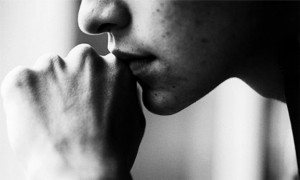Depression is a mood disorder. People who suffer from depression experience a number of symptoms including depressed mood, reduced motivation, decreased energy, feelings of helplessness and hopelessness, feelings of anger, increase or decrease in sleep, appetite, weight, sex drive, and problems concentration and memory. People who suffer from depression may also experience physical symptoms such as headaches, stomachaches, and muscle tension. These symptoms of depression in men interfere with their ability to function at school, work, in relationships, and ability to enjoy life.
 Depression in Men: Detection
Depression in Men: Detection
Depression affects more than 19 million Americans age 18 and older each year. Depression is a treatable illness that can occur in any one, at any time, and for various reasons regardless of age, gender, race, or income. Depression may be due to genetic, hormonal, or social (e.g. stress from work, family responsibility, roles and expectations, sexual abuse, poverty, abuse or neglect) factors.
Depression in men may go undetected. Male gender identity is based on dominance, separation, and individuation. Many boys are taught to be dominant and aggressive. The more hurt, vulnerable, or frightened the boy, the more aggressive he may become. Often men are taught to always be strong and persevere through tough times. Men may feel they cannot express emotions such as fear, hurt, or sadness because they have been discouraged from having these emotions. Talking about thoughts and feelings or even crying is not a luxury men allow themselves. Men may find it easier to express anger rather than sadness. Some use alcohol, drugs, food, or sex to cope with depression. In sum, depression often goes untreated in men and may manifest as aggression, being a workaholic, other addictions, or as not living up to one’s potential. If you are a man and notice any of these patterns in your life or experience persistent feelings of pessimism, lethargy, irritability, or sadness for two weeks or more, it’s important to seek help.
Men are more likely than women to die by suicide. Thoughts or death or suicide are usually signs of severe depression. Suicidal feelings, thoughts, impulses, gestures, or behaviors always should be taken seriously. If you are thinking about hurting or killing yourself, SEEK HELP IMMEDIATELY. If you know someone who has thoughts of suicide get them professional help or go to the local emergency room.
Symptoms
- Overwhelming feelings of sadness or grief
- Feeling worthless, helpless, or hopeless
- Sleeping more or less than usual
- Eating more or less than usual
- Having difficulty concentrating or making decisions
- Loss of interest in taking part in activities
- Decreased sex drive
- Avoiding other people
- Feeling unreasonable guilt
- Problems with memory
- Chronic pain or bodily symptoms that have no medical cause
- Low frustration tolerance
- Irritable or restless
- Impulsivity
- Loss of energy, feeling very tired
- Low self-esteem
- Thoughts of death or suicide
Risk Factors
- Youth ages 18-24
- Recent negative life events (e.g. loss of a loved one, moving, family problem)
- Chronic stressors (e.g. illness, care giving, academic struggles)
- Low self-esteem
- Lack of closeness with family and friends
- Traumatic experiences (e.g. sexual abuse, violence, rape)
- Family history of mood disorder
- Family history of addictions (e.g. drug or alcohol abuse)
Depression in Men: Treatment
Depression can be treated successfully by psychotherapy, medication, or a combination of both psychotherapy and medication.
Psychotherapy or counseling is a treatment in which people, through the help of a therapist, talk about the problems they are experiencing and find helpful ways of coping with difficulties in their lives. Therapists give support, expert feedback and interpretations, and help people find their own solutions rather than offer advice.
Medication used to treat depression are called anti-depressant drugs. These drugs act on brain chemicals which affect the way one feels. Anti-depressants usually take 2 to 3 weeks to start working and may have side effects. Patients prescribed medication by the psychiatrist should be carefully monitored by the psychiatrist.
Other helpful activities in managing depression are staying active through exercise, creating a support system by not isolating from friends and family, and engaging in activities that are positive and fun. Healthy eating habits, a regular sleep schedule, meditation, listening to music, self help books, and an optimistic view of life are also important.
Professionals have noted the reluctance of some men to seek therapy. Men need to know there is no shame in getting professional help. The fear of what others might think should not stop a man from doing what is best for his well being. Treatment works!